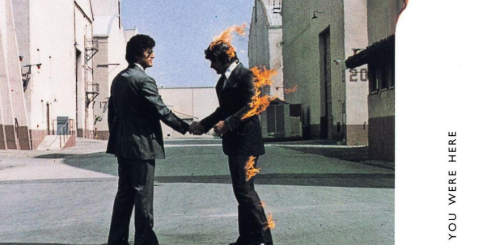If by Pink Floyd Lyrics Meaning – Unveiling the Layers of Self-Reflection
Lyrics
If I were a train, I’d be late
And if I were a good man
I’d talk with you
More often than I do
If I were to sleep, I could dream
If I were afraid, I could hide
If I go insane, please don’t put
Your wires in my brain
If I were the moon, I’d be cool
If I were a rule, I would bend for you
If I were a good man, I’d understand
The spaces between friends
If I were alone, I would cry
And if I were with you, I’d be home and dry
And if I go insane
Will you still let me join in with the game?
If I were a swan, I’d be gone
If I were a train, I’d be late again
If I were a good man
I’d talk with you
More often than I do
Pink Floyd, known for their poignant and introspective lyrics, crafted the song ‘If’ as a contemplative journey into the self. It is found on their 1970 album ‘Atom Heart Mother,’ nestled among an eclectic mix of experimental soundscapes. ‘If’ stands out with its starkly personal and hauntingly simple tone, inviting listeners to explore the hidden corners of the soul through a series of hypothetical scenarios.
Unlike the grandiose nature of much of Pink Floyd’s work, ‘If’ is stripped-down, offering a raw look at vulnerability and introspection. With enigmatic lines that pose more questions than they answer, the song taps into the universal human experience, while also hinting at the personal demons and philosophical musings of its enigmatic writer, Roger Waters.
A Swan’s Escape: The Allure of Freedom
The lyric ‘If I were a swan, I’d be gone’ unfolds the song with a desire for unburdened freedom. Swans are often symbols of grace and beauty, moving effortlessly through water, evoking a sense of peaceful liberation. This line suggests a yearning to break free from life’s constraints, encapsulating a common human sentiment of wanting to leave everything behind and start anew.
In the same breath, however, the line also carries an undercurrent of escapism, revealing a deep-seated need to detach and perhaps an acknowledgment of impermanence. The elegance with which these contradictory themes are interwoven throughout the song speaks to Pink Floyd’s lyrical mastery.
The Chronic Lateness of Existence
Waters uses the metaphor of a tardy train, ‘If I were a train, I’d be late,’ to touch upon the recurrent theme of time slipping away. It’s a wry acknowledgment of human procrastination and the often belated nature of our actions. The imagery suggests a struggle with punctuality not just in the literal sense, but in the larger context of life’s opportunities and milestones.
Moreover, the line seems to encapsulate a broader existential angst, hinting at a life that’s perpetually behind schedule and the pressure of catching up. It’s a poignant reflection, sewn from the very fabric of the human condition.
Interstellar Solitude and the Spaces Between Friends
Delving deeper into existential thoughts, ‘If I were the moon, I’d be cool’ and the subsequent mention of understanding ‘the spaces between friends’ merges cosmic imagery with personal distance. The moon, cold and solitary, represents isolation and the chill of emotional detachment.
Waters touches on the necessity of space in relationships, illustrating the paradox that sometimes, even the closest of bonds requires the silence of untold feelings and thoughts. The reference to bending rules suggests a willingness to compromise for another’s benefit, yet there’s an underlying acceptance of the chasms that can exist between individuals.
The Mad Hatter’s Game: Pink Floyd’s Dance with Insanity
Pink Floyd frequently visited themes of mental fragility, and ‘If’ is no exception. ‘If I go insane, please don’t put your wires in my brain’ confronts the fear of losing one’s mental faculties. The plea against invasive ‘wires’ is a metaphor for the fear of psychiatric intervention or the loss of control over one’s mind, resonating with the skepticism of institutionalized medicine prevalent in the late ’60s and early ’70s.
As the song progresses, the ask changes to whether his companions would still accept him in his madness, ‘Will you still let me join in with the game?’ This line unearths the primal fear of exclusion, pondering whether one’s identity and acceptance are conditional to mental soundness.
Echoes of Timeless Sentiment: ‘If’ and Its Most Memorable Lines
Throughout ‘If,’ Waters employs recurring phrases that reinforce the song’s most poignant themes. The repeated use of ‘If I were a good man, I’d talk with you more often than I do’ is a confessional regret, candidly voicing remorse over the distance one allows to creep into relationships.
This intimate admission, combined with the cyclical return to the swan and the train, emphasizes the human propensity to allow patterns of behavior to dictate our lives, often to our own lament. It’s within these lines that ‘If’ resonates as a timeless musing on life, love, and the depth of human connection.








